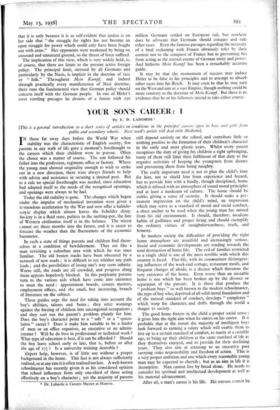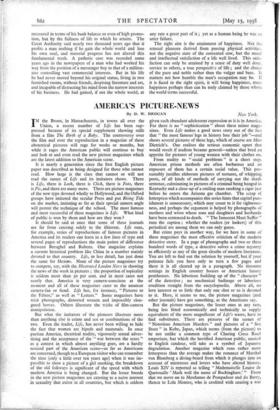YOUR SON'S CAREER : I
By E. D. LABORDE*
This is a general introduction to a short series of articles on conditions in the principal careers open to boys and girls front public and secondary schools. Next week's article will deal with Medicine] TN those far away days before the World War when .1L stability was the characteristic of English society, few parents in any walk of life gave a moment's forethought to the careers which their children were to pursue. Often the choice was a matter of course. The son followed his father into the profession, regiment, office or factory. Where the young man showed originality enough to wish to strike out in a new direction, there were always friends to help with advice and assistance in securing a desired post. But as a rule no special forethought was needed, since education had adapted itself to the needs of the recognised openings, and openings were always to be had.
Today the old stability is gone. The changes which began under the impulse of mechanical invention were given a tremendous acceleration by the War and now offer a kaleido- scopic display which almost leaves the beholder dizzy. Society is in a fluid state, politics in the melting-pot, the fate of Western civilisation itself is in the balance. The wisest cannot see three months into the future, and it is easier to forecast the weather than the fluctuations of the economic barometer.
In such a state of things parents and children find them- selves in a condition of bewilderment. They are like a man revisiting a suburban area with which he was once familiar. The old beaten tracks have been obscured by a network of new roads ; it is difficult to see whither any path leads ; and the possibilities of losing one's way seem infinite. Worse still, the roads are all crowded, and progress along them appears hopelessly blocked. In this perplexity parents turn to the various aids which have come into existence to meet the need : appointment boards, careers masters, employment offices, and the small, but increasing, branch of literature on the subject.
These guides urge the need for taking into account the boy's abilities, talents and bents ; they utter warnings against the forcing of children into uncongenial occupations ; and they sort out the parent's problem plainly for him. Does the boy's character point to a " safe " or a " specu- lative " career ? Does it make him suitable to be a leader of men or an office organiser, an executive or an admin- istrator ? Will he do best in professional or technical work ? What type of education is best, if it can be afforded ? Should the boy leave school early or late, that is, before or after the age of r7i ? Is a university training desirable ?
Expert help, however, is of little use without a proper background in the home. This fact is not always sufficiently realised, or at any rate it is often realised too late. A well-known schoolmaster has recently given it as his considered opinion that school influences form only one-third of those acting effectively on a boy's character ; yet the majority of parents
* Dr. Laborde is Careers Master at Harrow.
still depend entirely on the school, and contribute little or nothing positive to the formation of their children's character in the early and most plastic years. Whilst every parent recognises the duty of giving his children a right upbringing, many of them still limit their fulfilment of that duty to the negative activities of keeping the youngsters from disease and preventing them from being naughty.
The really important need is not to plan the child's time for him, not to shield him from experience and hazard, but to provide him with a kindly, though disciplined, home which is infused with an atmosphere of sound moral principles and at least a modicum of culture. The home should be stable, giving a sense of security. It should make a per- manent impression on the child's mind, an impression which may serve as a standard of moral and social conduct, a sheet anchor to be used when the young man has moved from his old environment. It should, therefore, inculcate habits of godliness and proper living and should exemplify the ordinary virtues of straightforwardness, truth, and honesty.
In modern society the difficulties of providing the right home atmosphere are manifold and increasingly serious. Social and economic developments are tending towards the total destruction of home life. The evil of families restricted to a single child is one of the most terrible with which this country is faced. Flat-life, with its concomitant disintegrat- ing influences of the week-end cottage, restaurant meals, and frequent changes of abode, is a disease which threatens the very existence of the home. Even worse than an unstable home is one which has been broken up by the divorce or separation of the parents. It is these that produce the " problem boys " so well known to the modern schoolmaster, the type of boy who, deprived of all solid moral foundation and of the natural standard of conduct, develops " complexes " which warp his character, and drifts through the world a danger to society.
The good home fosters in the child a proper social sense ; it gives him the right aim when he enters on his career. It is probable that at the outset the majority of intelligent boys look forward to earning a salary which will enable them to live up to a certain standard of comfort, to marry at a suitable age, to bring up their children at the same standard of life as they themselves enjoyed, and to provide for their declining years. They also aim at attaining to an executive post carrying some responsibility and freedom of action. This is a very proper ambition and one which every reasonable young man may be expected to cherish ; but as an aim in life it is incomplete. Man cannot live by bread alone. He needs to consider his spiritual and intellectual development as well as his material advancement.
After all, a man's career is his life. His success cannot be measured in terms of his bank -balance or even of high promo- tion, but by the fullness of life to which he attains. The Great Authority said nearly two thousand years ago that it profits a man nothing if he gain the whole world and lose his own soul, and material progress has not altered this fundamental truth. A pathetic case was recorded some years ago in the newspapers of a man who had worked his way from the position of a messenger boy to that of a million- aire controlling vast commercial interests. But in his life he had never moved beyond his original status, living in two furnished rooms, without friends, despising literature and art, and incapable of distracting his mind from the narrow interests of his business. He had gained, if not the whole world, at any rate a great part of it.; yet as a human being he was an utter failure.
The right aim is the attainment of happiness. Not the sensual pleasure derived from passing physical activities, not the negative state of the contented cow, but the moral and intellectual satisfaction of a life well lived. This satis- faction can only be attained by a sense of duty well done, service to others, a true perspective of life ; and the choice of the pure and noble rather than the vulgar and base. It matters not how humble the man's occupation may be. If it is faced in the right spirit, it will bring happiness, more happiness perhaps than can be truly claimed by those whom the world terms successful.















































 Previous page
Previous page